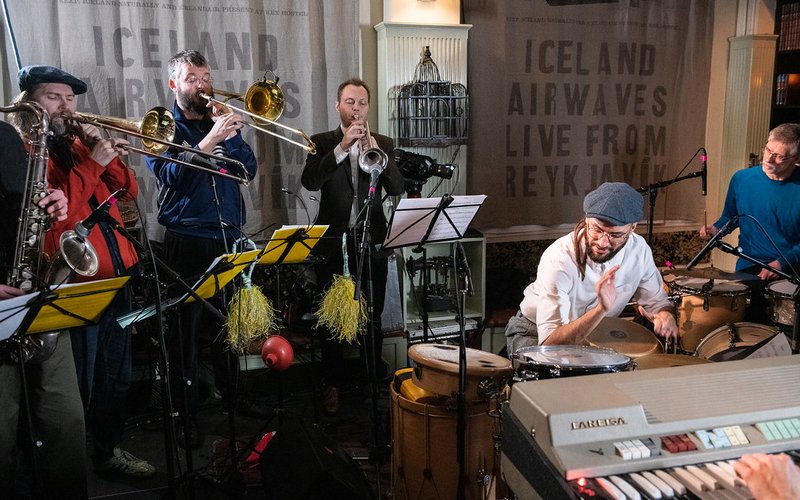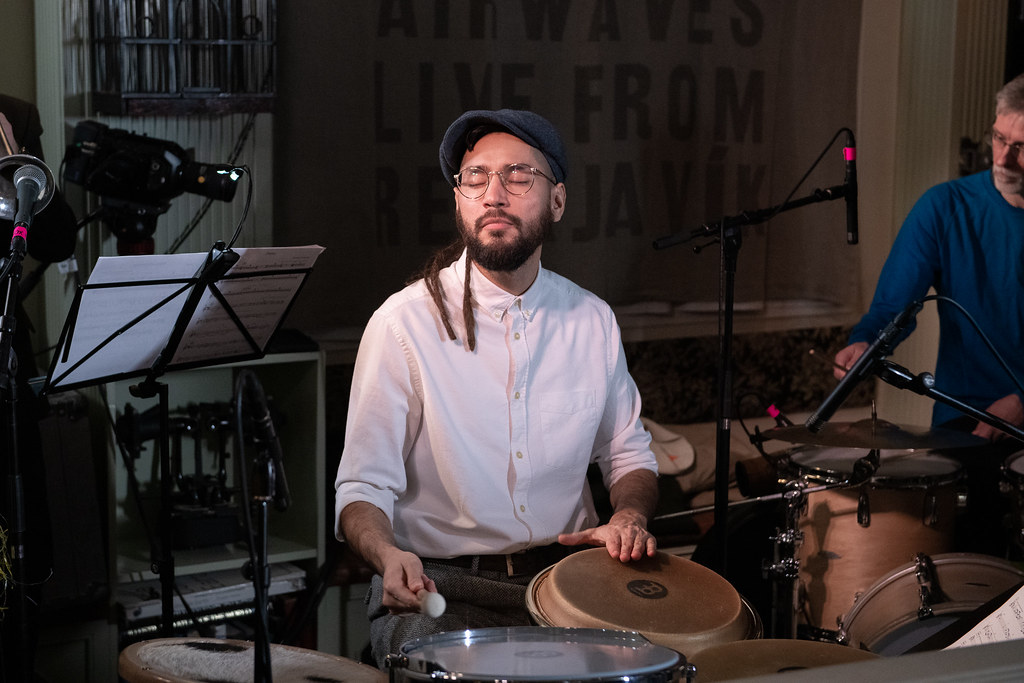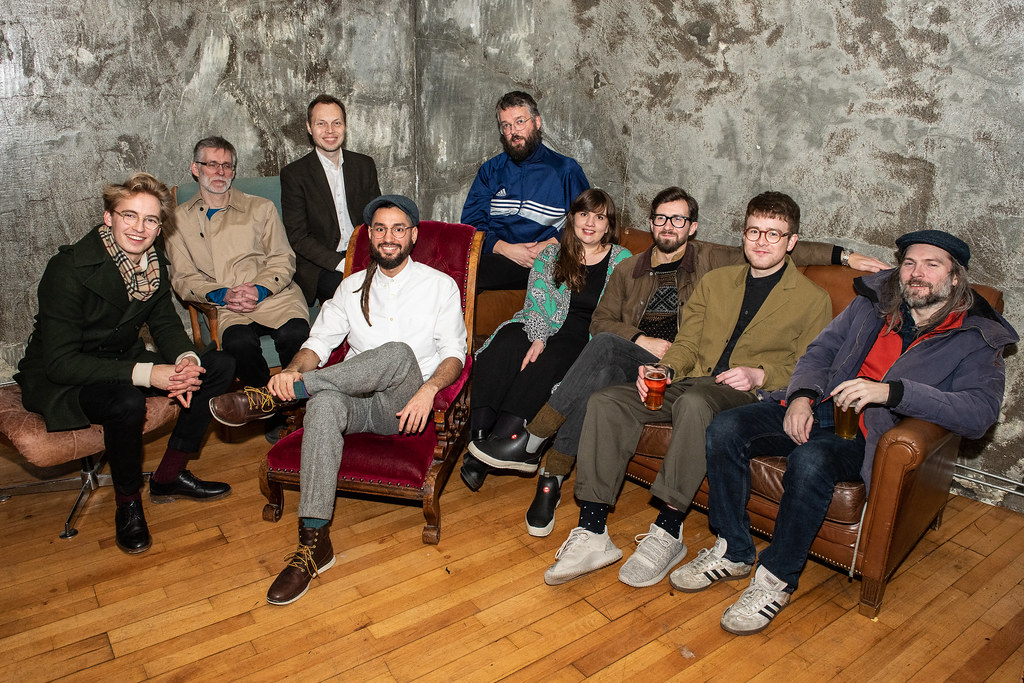
Iceland and Latin Jazz are two phrases not commonly paired together. That’s begun to change thanks to drummer and songwriter Kristofer Rodriguez Svönuson.
Svönuson’s Colombian and Icelandic heritage make him uniquely suited to bring this sound to the Nordic region. Growing up listening to Latin music at home, it was only natural that it would seep into his music. After picking up the drums in his late teens, Svönuson has gone on to be something of a fixture in Reykjavik’s music scene. Like many artists in the community, he plays in multiple bands – notably as a drummer for Hymnalaya and Junius Meyvant.
Throughout his musical exploits, he’s frequently supported his peers but in 2019 he began to branch out as a solo artist with his debut album Primo. It’s a record full of warmth, both in the sense that it harkens images of warmer climates but also a profound tenderness that glows between the Latin jazz rhythms. We saw this first-hand last year at Iceland Airwaves and you can watch for yourself in the video from their Kex Hostel performance below.
Primo, which translates to “cousin” in Spanish, finds Svönuson reflecting on familial bonds with lush, percussion-centric arrangements. With each song, he reflects on a different member of his family. As Svönuson tells it, there’s a mixture of sadness and happiness embedded in his work. It’s this complex mixture of feelings that makes Svönuson’s music so resonate. Without words, he’s able to convey the ambiguity of relationships and the swell of emotions that swirl within us. Even as you can bliss out to the languid tones, there’s a whole inner world to be explored within soft playing horns and twirling guitar melodies.
After Svönuson’s mesmerizing set at Kex on the eve of his album release, he sat down to chat with KEXP about the writing of his record, the story behind the cover art, and the tight bonds in the Icelandic music community.
KEXP: I was doing some reading up on you and I know that before your solo work, you drummed for many projects Hymnalaya and you've worked with Junius Meyvant. Have drums always been your primary instrument? What is it about that instrument that appeals to you most?
Kristofer Rodriguez Svönuson: Yes. Well, drums have been my main instrument, but I started late. I didn't start drumming for real until I was 17 years old. I had done like short term seminars before that. But when I was 17, I went all in and that's been my main instrument. I'm half Colombian, so I grew up listening to a lot of Latin, especially Colombian music from different parts of Colombia. That music is very rhythmic so that influenced me a lot and inspired me.

Do you feel like rhythm defines how you write your own music? When you write a song are you coming in thinking about the percussion first or how does that develop for you?
I think you can clearly hear through my songs that a drummer writes them. I think that's evident. Because maybe the chord progressions are maybe a bit more simple than if, for example, a pianist or a guitarist would have written them. I think the foundation is always the drums, but I write music on guitar and keyboards. Sometimes the melody starts while I'm playing the guitar. But I think I always have some kind of a feel or a groove in mind before I start writing music. And I never decide to write music. It just comes. So I don't decide, 'I'm gonna write a song.' It just kind of happens when I don't have the time to do it. Kind of seems to happen always during that moment.
You just released a new album, Primo. Tell me a little bit about how that record came about in like some of the ideas and concepts behind it.
Primo means cousin in Spanish. And it was actually my cousin that first got me into playing drums and we grew up like brothers. The title track of the album is written when I spent like... And that was the first song that I wrote for this album. I spent Christmas with him and his family maybe three years ago and he was playing with his kids and I had the guitar. This song came about when I was watching him play with his kids. Most of the songs are written about someone in my life. There's a song about my mom. There's a song about my goddaughter. I think they, like most of the songs, deal with some... I think there is a bit of sadness in all of the songs, but also happiness. It deals with some emotions that I've felt regarding each person that I write the songs for, in a way. Yeah, it's just like life.
I heard you took the photo for the album cover while you were riding your motorcycle. Is that correct? What was it about that image and moment that stuck out to you?
I was riding a motorcycle. It was in a small town called Montelíbano in Columbia. I was there when I was 19. So I was riding this motorcycle and was driving past the street and had the camera hanging on my neck. I just decided to take random photos, not maybe the safest way to drive, but I was 19. Then later on I looked through the photos and saw this photo and at that time I just decided – when I was 19, that's 10 years ago – I'm gonna make an album with this cover. It was just decided a long time ago that this photo would be the cover of the album.
Iceland has a long-standing history of musicians supporting one another and building community. Whether that's the collectives or less formal collaborations. Obviously you do that a lot. How have you experienced the community in Iceland today? Are you involved in any sort of collectives or groups of musicians in any way?
What I think is really – well, I'm not sure if it's special, but I think it's something that I really appreciate with the Iceland music society and culture is that everyone is kind of on the same team and they're all rooting for you. All the drummers here, they want to see you succeed. And I think that's really cool. You feel like it's a huge family. For example, just like this band that is playing with me, these are my favorite musicians and they have played with everyone from, say, Sigur Ros to Bjork, you name it. They have played with him. And still they are willing to just like hang out and meet on Saturday morning at my house and play. So I think there is not a lot of like hierarchy in the music scene here and everyone is just rooting for each other. It's not some planned or organized collective. It's just like the whole music scene is a team. And I really like that. For example, like the drummer, he used to be my teacher. He taught me twelve years ago and we just became really good friends. And now we were playing together and I think that's amazing.
Do you think there's any specific part of Iceland that makes everyone so willing to be on this level playing field as an artist or is it just how it naturally happens that way?
I haven't really thought about it. It definitely happens naturally. And maybe it's because it's a small community and we kind of just know each other. I think everyone is just really willing to do some stuff that maybe won't work and maybe it will work. They're just willing to try it. There is space to try stuff and to fail and to succeed. I think that's what I appreciate about it.
I also understand that Iceland provides financial assistance in some ways for artists. I'm curious to hear more if you've experienced that in any way. I know Iceland's not a very cheap place to live either. How does that work as a working musician?
Well, I haven't not had any like support from the government. But you there are unions here, musicians unions where you can apply for support and grants. I've done that. I got some support for this album, to make that album. And that's really nice. But I've been playing music as my only job for the past six years and in order to survive off music, you have to kind of just play at least five shows a week and play in a lot of bands just to be able to buy some porridge. And yeah, but it's fun [laughs]. It's a lot of work. But then then again that's also probably one of the reasons why everyone is so close to each other because we have to play a lot together in different setups and different bands. I think that might be a reason why we are so connected.

You just released your new record. Are you already thinking about what you want to do next? Are hoping to tour or anything like that?
I would love to tour but this is a really big band and I think that will never happen [laughs]. But maybe I'll try to make like a smaller combo to play this music. I'm studying to become a nurse as well. So I'm actually in the middle of my clinical studies. So I haven't had time to think. I've just been like working and then trying to put this album out the past few days, so. But yeah, I would love to go to some festivals and play this music for some people if there is a market for it or interested in it.
Is there anything you hope people take away from Primo when they listen to it?
I hope it brings them something positive. I'm not sure if that's the goal of the music, but I think how this music came about is just a need in me to write about certain feelings and about certain thoughts. But I definitely hope that it does something positive for people out there and that would maybe make this all worthwhile. I'm not going to put like a specific feeling that people should feel, but I just hope it brings them good vibes and maybe helps them out when they're feeling down.
Watch the Icelandic band's performance from Kex Hostel Iceland Airwaves 2019 and read an exclusive interview .
Watch the Icelandic band's performance from Kex Hostel Iceland Airwaves 2019 and read an exclusive interview .
Watch the band's performance from Iceland Airwaves 2019 and read an exclusive interview .